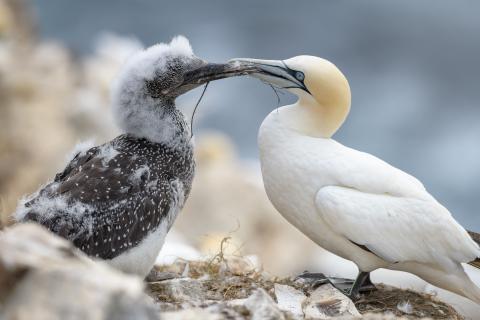The Open Ocean Trustee Implementation Group has released its Draft Restoration Plan 3 and Environmental Assessment: Birds (PDF, 304 pages) for public comment through April 28, 2023. The draft plan is available for review and in libraries and other repositories. A list of repositories is provided at the link below.
Draft Restoration Plan 3 and Environmental Assessment
Following the 2010 Deepwater Horizon oil spill, the Trustee Council created the Gulf Spill Restoration project portal to accept restoration project ideas from the public. In March 2021, the Open Ocean Trustees invited public input to identify opportunities for restoration in the Open Ocean Restoration Area for the Sturgeon and Birds Restoration Types. After screening project ideas, we decided to forego including sturgeon projects in this restoration plan.
Of the more than 76 project ideas received by the May 2021 deadline, the Trustees narrowed the list to 11 bird restoration projects, and a “no action” alternative for evaluation in this draft restoration plan. Based on this evaluation, we are proposing seven preferred alternatives for implementation.
The total estimated cost for these preferred alternatives is approximately $26 million.
The draft restoration plan and proposed projects are consistent with the Trustee Council's Programmatic Restoration Plan, and include a variety of bird restoration techniques. The preferred alternatives would:
-
improve seabird nesting colonies through habitat enhancement, as well as predator and invasive species management;
-
reestablish seabird colonies by attracting breeding adults to restoration sites; and
-
work through collaborative partnerships to identify and implement strategies to reduce the risk of seabird bycatch.
Additional information on the proposed projects is available in the draft restoration plan and factsheets, linked below.
Public Comment and Webinars
The 45-day public review and comment period for the draft restoration plan is March 14 through April 28, 2023. After the public comment period concludes, the Trustees will review, consider, and address comments prior to the release of the Final Restoration Plan 3 and Environmental Assessment.
Public comments can be submitted online, through the mail, or over the phone:
-
By mail:
U.S. Fish and Wildlife Service Gulf Restoration Office
1875 Century Blvd.
Atlanta, GA 30345 -
Toll-free phone: 1-888-467-0009
Public comments can also be submitted at any of the virtual public webinars. To register for a webinar, please use one of the links below:
-
March 28, 12:00 pm Eastern: Please register for the public webinar at:
https://register.gotowebinar.com/register/3885331473823586650 -
April 4, 4:00 pm Eastern: Please register for the public webinar at:
https://register.gotowebinar.com/register/5844966858752951643
After registering, participants will receive a confirmation email with information on how to join.
The webinars will consist of a formal presentation with information about the draft restoration plan. They will also provide an opportunity for questions and answers and public comment. At any time during the public comment period, comments may be submitted online, by phone, or by mail, as described above.
The webinar presentation will be posted on the Gulf Spill Restoration website. Spanish and French translated version of the presentation will also be available on the website. Please contact us at gulfspill.restoration@noaa.gov by March 21, 2023 if you have any questions or need any special assistance in order to participate in the webinar.
Draft Plan, Fact Sheets, and Other Documents
-
Draft Restoration Plan 3 and Environmental Assessment (PDF, 304 pages)
-
Executive Summary (PDF, 8 pages); Translated into Spanish (PDF, 9 pages); Translated into French (PDF, 9 pages)
-
List of Repositories (PDF, 1 page)
Factsheets
-
Draft Restoration Plan 3 and Public Involvement (PDF, 3 pages); Translated into Spanish (PDF, 3 pages); Translated into French (PDF, 3 pages)
-
Restoration Techniques for Draft Restoration Plan 3 Proposed Projects (PDF, 3 pages); Translated into Spanish (PDF, 3 pages); Translated into French (PDF, 3 pages)
-
Common Tern Nesting Colony Restoration in Manitoba (PDF, 2 pages); Translated into Spanish (PDF, 2 pages); Translated into French (PDF, 2 pages)
-
Invasive Goat Removal to Restore Seabird Nesting Habitat in St. Vincent and the Grenadines (PDF, 2 pages); Translated into Spanish (PDF, 2 pages); Translated into French (PDF, 2 pages)
-
Northern Gannet Nesting Colony Restoration in Eastern Canada (PDF, 2 pages); Translated into Spanish (PDF, 2 pages); Translated into French (PDF, 2 pages)
-
Predator Removal and Seabird Nesting Colony Restoration at Mona Island (PDF, 2 pages); Translated into Spanish (PDF, 2 pages); Translated into French (PDF, 2 pages)
-
Seabird Nesting Colony Reestablishment and Protection at Desecheo National Wildlife Refuge (PDF, 2 pages); Translated into Spanish (PDF, 2 pages); Translated into French (PDF, 2 pages)
-
Seabird Nesting Colony Protection and Enhancement at Dry Tortugas National Park (PDF, 2 pages); Translated into Spanish (PDF, 2 pages); Translated into French (PDF, 2 pages)
-
Seabird Bycatch Reduction in Northeast U.S. and Atlantic Canada Fisheries (PDF, 2 pages); Translated into Spanish (PDF, 2 pages); Translated into French (PDF, 2 pages)
We also send updates out via email. If you haven't already, please take the opportunity to sign up for email updates today to receive the latest news from all the Deepwater Horizon Trustees.


